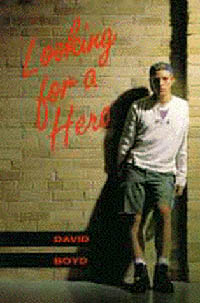|
________________
CM . . . .
Volume VII Number 4 . . . . October 20, 2000
excerpt: Dr. Walton: Do you know who Robert Player is, Nicholas?We are all looking for heroes, people who exemplify what we, ourselves, are reaching for in life. Looking for a Hero is a searing examination of what can happen when our heroes have tragic faults that lead us and them to destruction. Nicholas Sparks, the 14-year-old main character of this novel, has just killed his older brother's hero, a famous rock musician, in a bizarre attack during a fencing class at Nicky's private school, Mission. The novel is a series of taped interviews between Dr. Cheung, his psychiatrist, Nicky, his parents, his best friend, Willie, and one of Nicky's teachers. There are also notes and letters from other doctors and the detective assigned to the case. Parts of this novel, titled by the seasons of the year, are flashbacks to Nicky's childhood and his love/hate relationship with his older brother, Christian. These flashbacks lead the reader to believe that Nicky's relationship with Christian was destructive even when they were younger, and we learn from Willie that "Christian pushed Nicky to do things he didn't really want to do." As the novel progresses, Christian's death from AIDS brought on by intravenous drug use encouraged by Player, his hero, clarifies Nicky's actions. Nicky is an intelligent boy, a strong student and a competent athlete, the last kind of child you would expect to commit murder. But Nicky's hero worship of his older brother is at the centre of this novel. The secondary characters in this novel are very strong: Mr. Sparks, the father in denial; Dr. Cheung, the compassionate, professional psychiatrist; Willie, the ultimate, loyal friend in the face of tragedy; Mr. Ambrose, the concerned teacher; and Dr. Kauffman, Christian's physician. Their personalities come alive in their documented words. You might wonder if this novel, published is 1993, would be out of date as far as AIDS is concerned. The answer? Not at all. The horror of caring for a son and brother with AIDS as he lies dying is not hidden. Neither is the desire on Christian's part to take drugs. His desire to emulate his hero leads him to actions that ultimately cost him his life. No punches are pulled here. This is the novel that I look for whenever I know I have to engage an older student who has not committed to making reading a part of his life yet. It almost always grips the imagination of such a reader so that he comes back with the words: "This was a great book ...." It is a great book that should be in every middle school and junior high collection. Highly Recommended. Joan Marshall is a teacher-librarian in Winnipeg, MB.
To comment on this title or this review, send mail to cm@umanitoba.ca.
Copyright © the Manitoba Library Association.
Reproduction for personal use is permitted only if this copyright notice
is maintained. Any other reproduction is prohibited without
permission.
Published by
TABLE OF CONTENTS FOR THIS ISSUE - October 20, 2000.
AUTHORS |
TITLES |
MEDIA REVIEWS |
PROFILES |
BACK ISSUES |
SEARCH |
ORDER |
CMARCHIVE |
HOME
|
